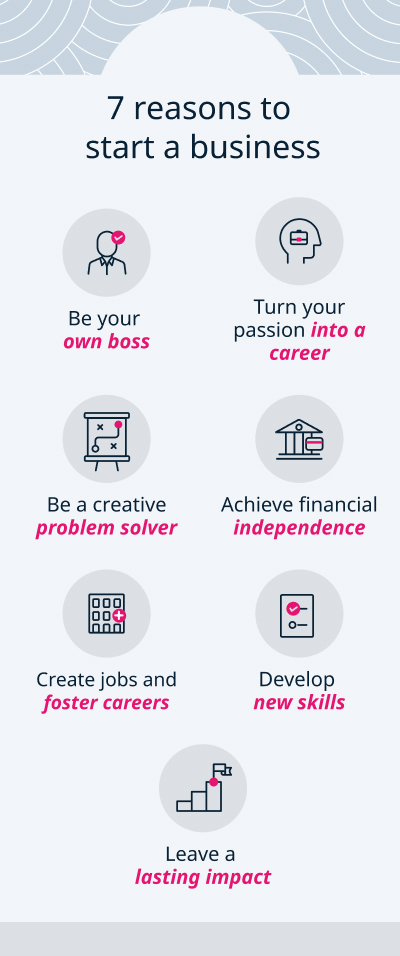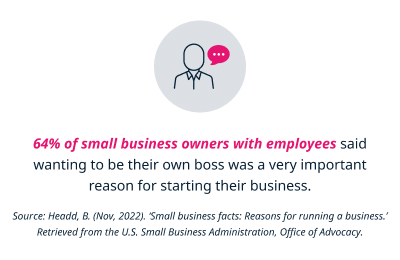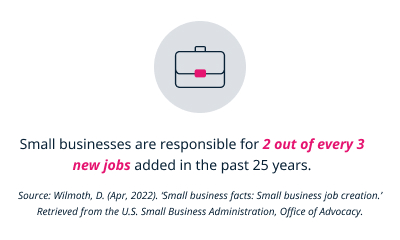7 reasons to start a business and work for yourself
Small businesses are a big business: businesses with fewer than 500 employees account for 99.9% of all firms in the United States.1 This is a global trend, too. There are approximately 3 million small businesses operating in South Africa.2
And they’re some of the most positively-viewed institutions in the United States. 86% of Americans say small businesses have a positive impact on the country — a stronger approval rating than the military, churches, and schools.3
Starting your own company comes with a lot of risk, but it can also be highly rewarding. For many, it is a chance to take control of their career and the allure of being your own boss can outweigh the uncertainty.
If working nine to five isn’t suited to you, perhaps it’s time to climb your own ladder, set a pace that suits you, and make your mark on the world. If you have a bright idea or a burning interest, here are seven good reasons for starting a business today.

Seven reasons to start a business:
- Be your own boss
- Turn your passion into a career
- Be a creative problem solver
- Achieve financial independence
- Create jobs and foster careers
- Develop new skills
- Leave a lasting impact
1. Be your own boss
One of the most compelling reasons to start your own business is the freedom to call the shots. When you work for yourself, you’re the one in control. This sense of ownership is a compelling motivator for many: 64% of small business owners with employees say it was a very important reason they got started.4
You set the vision, make key decisions, and shape your own destiny. You decide how time is spent, what kind of company culture will reflect your values, and the quality of work that should be expected. It’s a chance to build a career on your own terms, where your hard work directly benefits you and the future you’re building.
Some of the benefits of being your own boss include:
- Choose your clients and projects: You get to work on projects you’re truly passionate about and with clients who share your vision and values.
- Set your own hours: While starting a business often means long hours, it also comes with the flexibility to create a workday and schedule that suits your lifestyle.
- Build the team you want: You can hire people who share your vision and values, creating a positive and productive work environment.

2. Turn your passion into a career
For many entrepreneurs, starting a business is an opportunity to transform a hobby or deep expertise into a viable career. Without the boundaries of someone else’s vision, you can build a business tailored to you and your interests.
- Jing Gao originally moved back to China for a tech job and soon, she was reconnecting with her family and her heritage through food. That passion took her from a culinary blog, to opening up a restaurant in Shanghai, and finally founding Fly By Jing, a modern Asian food brand.5
- In college, Melanie Perkins tutored graphic design students and watched them spend entire semesters navigating a steep learning curve. She envisioned a better platform that was online and accessible. Perkins started small, creating a tool specifically for designing yearbooks that grew into something more. Today, Canva is used by more than 125 million people.6
- Alli Webb was a professional hairstylist who needed a side hustle in 2009. Her mobile blowout business, Straight At Home, offered in-home salon styling for half the price. She eventually established a brick and mortar location (and has more than 160 locations as of 2023).7
3. Be a creative problem solver
Traditional jobs can come with strict rules, a rigid hierarchy, and a set way of doing things. But as an entrepreneur, you are the chief creative officer. You have the freedom to think outside the box and turn your ideas into reality. From finding innovative ways to solve problems to crafting a brand identity unique to you and your goals, there is creativity in every aspect of running your own business.
- Design your business from scratch: From the logo and website to the customer experience, you get to build a brand that is a unique expression of your vision.
- Solve problems your way: You can develop new solutions to market needs without following a corporate playbook.
- Experiment with new ideas: You have the freedom to test new products, services, or marketing strategies and pivot quickly based on the results.
4. Achieve financial independence
Building a stable, profitable business isn’t easy. Fewer than half of new employer establishments survived at least five years between 1994 and 2020.8 It’s why passion and planning are crucial to success. For the business owners that persevere, the financial rewards can be life-altering.
- No cap on your income: Your potential to earn is directly tied to the success of your business, not a fixed annual salary.
- Build an asset: Unlike a job, a successful business is a tangible asset that can be sold for a significant payout, providing long-term financial security.
- Create generational wealth: The money you earn and the asset you build can be a foundation for your family’s financial future.
5. Create jobs and foster careers
Small businesses drive the majority of job growth in the United States; they are responsible for two out of every three jobs created in the last 25 years.9 In South Africa, small, medium, and micro enterprises (SMMEs) account for 60% of all jobs.10 As your business grows, you have the opportunity to create jobs, hire talented individuals, and provide them with a supportive environment to grow their own careers.
This allows you to have a positive impact on your community by stimulating the local economy and giving others a chance to grow professionally.
- Help your community thrive: Your business can create new jobs and contribute to the economic health of your town or city.
- Provide a great place to work: You can build a company culture that is positive, supportive, and truly values its employees.
- Be a mentor: You have the chance to guide and develop the next generation of professionals.

6. Develop new skills
If you think you possess a range of key talents, entrepreneurship presents a way to utilize these skills to their full potential.
As an entrepreneur, you’ll fill many roles in your business, especially when starting out, which is why you can’t be afraid of doing the dirty work. Many days you’ll find yourself in the position of anything from leader and marketer to therapist and receptionist.
Essential entrepreneurial skills include the following:11
- Business management skills, which include multitasking, delegating, and making decisions about your company’s health and profitability
- Teamwork and leadership skills are essential — in a small business, you’ll likely be supervisor and team member
- Customer service skills will help you connect with your customer base and establish opening partnerships
- Financial skills are needed to ensure you understand and control the money side of your business
- Strategic thinking and planning skills are necessary to stay competitive, reach your business goals, and grow your market reach
- Branding, marketing, and networking skills will be deployed to promote and grow your brand until you can hire someone to take this over
7. Leave a lasting impact
Whether you are solving a pressing problem, creating a product that improves lives, or building a company culture that serves as a model for others, your work can have a ripple effect. This impact can extend to your employees, your community, and even your industry, making entrepreneurship a direct path to leaving a meaningful and lasting mark on the world.
- Support causes you believe in: Beyond your core business, you can use your company’s success to make a difference by donating a portion of your profits to social causes, or by creating partnerships with non-profits.
- Create social good: You can build a business that is centered around a mission you care about, such as creating sustainable products or providing services to underserved communities.
Develop your strategic expertise with online business management courses, offered on GetSmarter in collaboration with the world’s leading universities.
If you want to challenge yourself and grow your entrepreneurial skills, consider joining the Oxford Entrepreneurship: Venture Creation Programme from Saïd Business School, University of Oxford. This six-week programme offers practical guidance, from identifying a market opportunity and developing a business model to learning how to launch and pitch your venture.
Similarly, the University of Cape Town (UCT) offers the Foundations of Business Management online short course. This eight-week course helps students to gain leadership, marketing, finance, market-research, and competitive-analysis skills.
- 1 (Mar, 2023). ‘Frequently asked questions.’ Retrieved from the U.S. Small Business Administration, Office of Advocacy.
- 2 Solomons, D. (Sep, 2024). ‘FinScope MSME South Africa 2024: Key findings highlight urgent need for informal sector support.’ Retrieved from Finmark Trust.
- 3 (Feb, 2024). ‘From businesses and banks to colleges and churches: Americans’ views of U.S. institutions.’ Retrieved from Pew Research Center.
- 4 Headd, B. (Nov, 2022). ‘Small business facts: Reasons for running a business.’ Retrieved from the U.S. Small Business Administration, Office of Advocacy.
- 5 Goldberg, M. (May, 2022). ‘How I got my job: launching a hot chile crisp brand on the internet.’ Retrieved from Eater.
- 6 Eloise Lamond, S. (May, 2024). ‘Canva: How Melanie Perkins built a $40 billion design empire.’ Retrieved from The Million Dollar Thinker, Medium.
- 7 Huddleston Jr., T. (Dec, 2023). ‘Drybar co-founder used her life savings to build out her side hustle: ‘I felt so strongly it was going to work’.’ Retrieved from CNBC.
- 8 (Mar, 2023). ‘Frequently asked questions.’ Retrieved from the U.S. Small Business Administration, Office of Advocacy.
- 9 Wilmoth, D. (Apr, 2022). ‘Small business facts: Small business job creation.’ Retrieved from the U.S. Small Business Administration, Office of Advocacy.
- 10 Okechukwu, K. (Apr, 2024). ‘South Africa to create a million new SMMEs by 2030.’ Retrieved from 22 on Sloane.
- 11 Herrity, J. (Jul, 2025). ‘A guide to entrepreneurial skills: definition and examples.’ Retrieved from Indeed.

